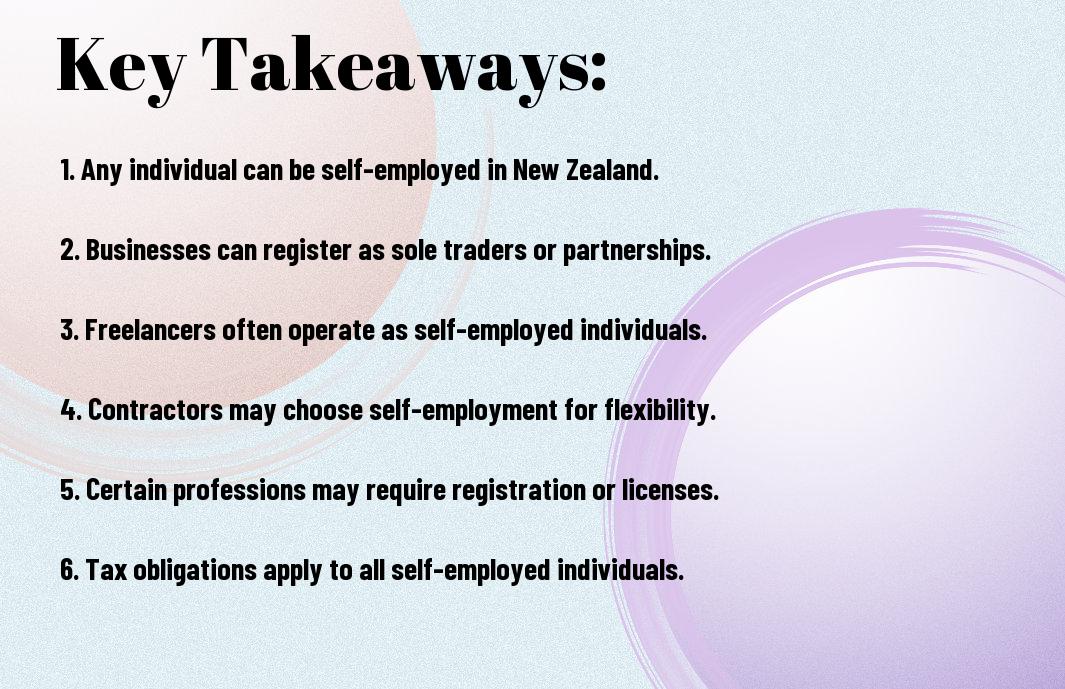It’s crucial to understand the criteria for self-employment in New Zealand if you’re considering this path. Various groups, including freelancers, contractors, and business owners, can operate independently while navigating the local regulations. This post will guide you through the factors that determine your eligibility for self-employment, including age, residency status, and business structure. Whether you’re a budding entrepreneur or seeking to transition from traditional employment, this information will help you make informed decisions about your self-employment journey in New Zealand.
Key Takeaways:
- Legal Status: Individuals over 18 in New Zealand can be self-employed as long as they comply with local laws.
- Types of Work: Self-employment includes freelancers, contractors, and business owners across various industries.
- Tax Obligations: Self-employed individuals must register with the Inland Revenue and adhere to tax payment schedules.
- Business Registration: Depending on the business structure, some may need to register their business name or company with the Companies Office.
- Market Demand: Successful self-employment often relies on market demand and the ability to promote one’s services or products effectively.

Understanding Self-Employment in New Zealand
A comprehensive grasp of self-employment in New Zealand is crucial for anyone considering this career path. Self-employment offers individuals the opportunity to work independently, allowing for flexibility in work hours and the nature of services provided. However, navigating the self-employment landscape requires an understanding of legal obligations, tax responsibilities, and business management. This knowledge is fundamental to successfully establishing and operating your own business in New Zealand.
Definition of Self-Employment
Before you can launch on your self-employment journey, it’s important to understand what self-employment entails. Self-employment refers to individuals who operate their own businesses and are not classified as employees of another entity. You are directly responsible for managing your business and bearing the risks associated with it. This can include various sectors and industries, each with its specific regulations and requirements.
Types of Self-Employment
There are several types of self-employment opportunities available in New Zealand, catering to diverse skills and interests. These types include:
- Freelancing
- Consulting
- Contracting
- Owning a small business
- Working as a sole trader
Perceiving the differences between these options will help you identify the best fit for your skills and lifestyle.
| Type of Self-Employment | Description |
|---|---|
| Freelancing | Offer your skills to various clients on a project basis. |
| Consulting | Provide specialized advice in your area of expertise. |
| Contracting | Work on specific projects for businesses temporarily. |
| Owning a Small Business | Manage a full-scale business typically employing others. |
| Sole Trader | Operate your own business independently. |
Further exploring the types of self-employment can help you determine what aligns with your passions and capabilities. It’s important to consider your skills and the market demand when assessing your options. This approach allows for thoughtful decision-making in the pursuit of self-employment.
- Evaluate your skills and interests
- Research industry demands
- Network with other self-employed individuals
- Consider the financial and legal implications
- Test the waters with small projects or clients
Perceiving different avenues in self-employment will empower you to make informed choices that resonate with your aspirations.
| Consideration | Importance |
|---|---|
| Skills Assessment | Identifies core strengths for business success. |
| Market Research | Informs you on demand for services/products. |
| Financial Planning | Ensures sustainability and profitability. |
| Networking | Builds connections and potential client bases. |
| Legal Compliance | Protects you from potential legal issues. |
Eligibility Criteria for Self-Employment
You must meet specific criteria to be eligible for self-employment in New Zealand. This includes understanding the legal requirements, ensuring you comply with age and residency regulations, and evaluating the type of business you intend to establish. By fulfilling these criteria, you can navigate the self-employment landscape and successfully run your own venture.
Legal Requirements
Along with personal suitability, you need to adhere to several legal requirements, such as registering your business, obtaining necessary licenses, and ensuring compliance with tax obligations. These elements contribute to the legitimacy of your self-employed status in New Zealand.
Age and Residency Requirements
An important factor in your eligibility for self-employment is that you must be at least 18 years old and a resident or citizen of New Zealand. This enables you to legally enter contracts and fulfill the responsibilities that come with running your own business.
A New Zealand citizen or permanent resident can easily establish a self-employment status, as this grants you the right to work and operate a business without restrictions. If you are a temporary resident or on a specific visa, ensure your visa conditions allow you to engage in self-employment. Understanding these requirements will help you take the necessary steps toward building a successful self-employed career.

Common Professions and Industries
Once again, various professions and industries in New Zealand provide self-employment opportunities. You can find self-employed individuals across sectors such as construction, creative arts, technology, healthcare, and consultancy. Many professionals have chosen self-employment to gain greater control and flexibility in their careers, allowing them to tailor their work life to their unique skills and passions.
Freelancers and Contractors
Contractors are an crucial part of New Zealand’s self-employed landscape. If you possess specialized skills or expertise, you can work on a project basis for various clients, offering your services without long-term commitments. This flexibility allows you to manage your workload while pursuing multiple opportunities simultaneously, which can enhance both your income and experience.
Small Business Owners
After exploring the world of self-employment, many choose to become small business owners. This path allows you to turn your ideas into reality by starting a business that reflects your values and vision. From cafés to online shops, the variety of business types is vast, showcasing your creativity and entrepreneurial spirit.
Indeed, venturing into small business ownership can be an exciting journey, allowing you to create jobs, contribute to your local economy, and establish a brand that resonates with your community. As a small business owner, you have the opportunity to shape your business model, marketing strategies, and customer interactions. This freedom empowers you to achieve personal fulfillment while navigating the challenges and rewards of entrepreneurship. With the right planning and dedication, your small business can thrive in New Zealand’s dynamic market.
Benefits of Being Self-Employed
Keep in mind that being self-employed in New Zealand offers numerous advantages that can enhance your professional and personal life. From flexibility in your work schedule to the potential for higher earnings, self-employment can be a rewarding path. It allows you to pursue your passions, make decisions that align with your values, and create a work environment that suits your individual needs.
Flexibility and Autonomy
By choosing to be self-employed, you gain the freedom to set your own hours and work from wherever you prefer. This autonomy allows you to tailor your work-life balance according to your lifestyle, enabling you to prioritize personal commitments and interests while pursuing your professional goals.
Financial Opportunities
Between the potential for increased income and the ability to control your own expenses, being self-employed can offer substantial financial advantages. You have the opportunity to directly benefit from your hard work and dedication, enabling you to set competitive rates for your services or products.
Understanding these financial opportunities allows you to maximize your earning potential. As a self-employed individual, you can scale your business according to market demands, explore diverse revenue streams, and keep the profits from your efforts, rather than sharing them with an employer. This financial independence can lead to greater wealth-building possibilities and can set the stage for long-term financial security.
Challenges and Considerations
After deciding to become self-employed in New Zealand, you may encounter various challenges and considerations that require your attention. These can range from navigating complex tax obligations to managing fluctuating income. Understanding these hurdles is imperative for establishing a successful and sustainable self-employed career.
Financial Management
To thrive as a self-employed individual, effective financial management is vital. You will need to track your income and expenses diligently, set aside funds for taxes, and create a budget that can accommodate varying income levels. This financial vigilance helps prevent cash flow issues and ensures you remain compliant with New Zealand’s tax regulations.
Work-Life Balance
Financial stability as a self-employed person is important, but so is maintaining a healthy work-life balance. You may find it challenging to separate your personal and professional life, especially since your work is often flexible and home-based. Setting clear boundaries, scheduling breaks, and prioritizing self-care will help you manage your time effectively.
Further, achieving a good work-life balance involves creating routines that allow you to unwind after work hours. Consider allocating specific times for work tasks and personal activities to enhance your overall well-being. Engaging in hobbies or spending time with loved ones can recharge your energy and keep you motivated, ultimately benefiting your self-employed venture.
Resources and Support for the Self-Employed
All self-employed individuals in New Zealand can access a variety of resources and support to help navigate their journeys. From government initiatives to industry-specific organizations, you have numerous options available that offer guidance, training, and financial advice, ensuring your business can thrive in a competitive environment.
Government Resources
Along your self-employment journey, you can take advantage of various government resources designed to support entrepreneurs. The New Zealand Government provides a wealth of information on business registration, tax obligations, and available grants through websites like business.govt.nz. These resources equip you with the knowledge needed to establish and manage your business effectively.
Industry Support Organizations
Below are key organizations that can provide valuable assistance and networking opportunities within your industry. These groups often offer training programs, mentorship, and access to industry-specific resources that can help you expand your skills and grow your business.
Resources provided by industry support organizations can be vital in helping you succeed as a self-employed professional. They often host events, workshops, and networking sessions tailored to your field, allowing you to connect with peers and mentors who can provide insights and guidance. Additionally, many organizations offer exclusive access to tools, research, and market analysis, empowering you to make informed decisions that align with industry trends.
Conclusion
Hence, as a New Zealand resident or citizen, you can be self-employed if you engage in business activities either on your own or as a partnership. Whether you’re a freelancer, a small business owner, or involved in trades, you have the freedom to choose your path. Just ensure you understand your tax obligations and any licenses you may need. With the right planning and commitment, self-employment can offer you a rewarding career with the flexibility you desire.
FAQ
Q: Who is eligible to be self-employed in New Zealand?
A: In New Zealand, anyone of legal working age can become self-employed. This includes New Zealand citizens, residents, and foreign nationals who hold the appropriate work visas. Individuals must also comply with any specific professional licensing requirements depending on their industry.
Q: Do I need to register my self-employed business in New Zealand?
A: Yes, if you are self-employed, you may need to register your business. This typically involves registering your business name with the Companies Office if you operate under a company structure. Additionally, you must register for Goods and Services Tax (GST) if your annual turnover exceeds the threshold set by the New Zealand government.
Q: What types of work can I do if I am self-employed in New Zealand?
A: Self-employment opportunities in New Zealand are diverse and can include freelance services, consultancy, trades, retail businesses, online ventures, and more. As long as the work complies with New Zealand laws and regulations, individuals can pursue various fields, including creative industries, hospitality, construction, and technology.
Q: Are there any tax obligations for self-employed individuals in New Zealand?
A: Yes, self-employed individuals in New Zealand are required to file an annual tax return and pay income tax on their earnings. It is important to keep accurate records of all income and expenses to ensure compliance. Depending on your income level, you may also be required to register for GST.
Q: Can a self-employed person access government support in New Zealand?
A: Yes, self-employed individuals in New Zealand may have access to certain government support services and resources, including business grants, loans, and advisory services. During specific situations, such as economic downturns or natural disasters, self-employed individuals may also qualify for financial assistance or relief programs offered by the government.

